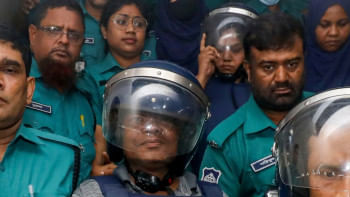Follow due diligence when recording cases

On Tuesday, Law Adviser Dr Asif Nazrul expressed that the interim government was embarrassed by the continued filing of "ghost" cases—a troubling legacy from the ousted autocratic regime of the Awami League. We appreciate this candid acknowledgment from the law adviser, a transparency we did not see from the previous regime. The law adviser clarified that the interim government was not behind such cases; instead, it is ordinary citizens, many of whom were politically victimised under the previous regime, who are now filing these frivolous cases. He further mentioned seeking advice from the judicial reform commission on how to address this crisis. But with the harassment of potentially innocent citizens continuing, we must demand answers and greater efforts from the government.
Consider, for instance, the case of Mohammad Zaman Hossain Khan. Zaman, a former student leader of BNP, filed a case with a Dhaka court on October 29 against 196 individuals for attempted murder through firing at protesters during the July-August uprising. Among the accused are 53 former secretaries that Zaman alleged to be "agents of foreign intelligence" and "collaborators of fascism, harmful towards the state, and corrupt officials." According to a report by Prothom Alo, some of these accused individuals retired years ago. When questioned about this, Zaman suggested their role during the previous regime was questionable. But are his allegations based on concrete evidence? More importantly, why did the sheer number of accused not raise red flags for the authorities when this case was filed?
Zaman's case is not an isolated example. In October, this daily reported two First Information Reports (FIRs) filed with the Jatrabari Police Station that listed the same 442 individuals as accused for the deaths of two people who died on different days and under different circumstances in July. What justification did the police have for recording such dubious FIRs?
If the allegations are substantiated, the accused should indeed face consequences. But what about cases that are ultimately proven baseless and politically motivated? A veteran political expert told Prothom Alo that filing such cases is, in itself, a crime. Yet no legal action has been taken against those filing frivolous cases. This must change. To end this "culture of filing wholesale cases," which the law adviser said the interim government wants to do, it must take immediate action. Police must exercise due diligence before registering any case, ensuring that only cases with actionable claims and a reasonable number of suspects are recorded. And those who deliberately file "ghost" cases should be held accountable.


 For all latest news, follow The Daily Star's Google News channel.
For all latest news, follow The Daily Star's Google News channel. 











Comments